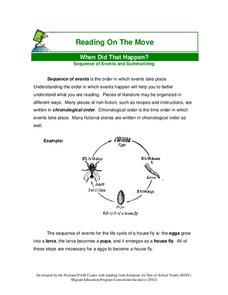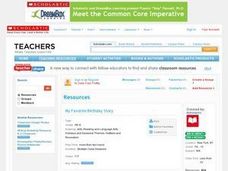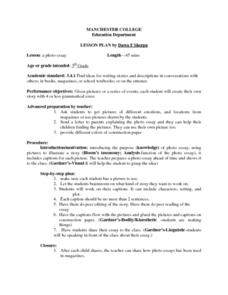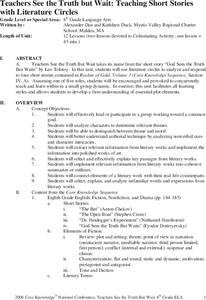August House
Why Koala Has a Stumpy Tail
Learn about the animals of Australia with a language arts lesson about an Australian folktale called, Why Koala Has a Stumpy Tail. After reading the story as a class, kids discuss events and characters from the book, retell the story to...
Scholastic
Tell Us a Tale: Teaching Students to Be Storytellers
Encourage scholars to retell their favorite short story or folktale, adding personal details to make it their own. After reading their book of choice several times, story tellers retell a tale verbally to their classmates.
August House
The Pig Who Went Home on Sunday
Turn your classroom into a pig sty with a instructional activity based on the Appalachian folktale The Pig Who Went Home on Sunday. Similar to the story of The Three Little Pigs, the folktale tells a story of four pigs who leave home—and...
The New York Times
Sequencing the Stages: Understanding H.I.V. Infection at the Molecular Level
How does HIV operate at the molecular level? Pupils discover the progression from a healthy immune cell to one infected with HIV, watch an animation of the HIV life cycle, and finally identify each of the stages with illustrations on...
Curated OER
When Did That Happen?
An awesome packet teaches individuals how to chronologically order and sequence events. The resource also provides practice that immediately follows the different ways to order events. Lastly, learners read a newspaper article...
Weebly
Author Study: Eric Carle
Dive into an author study of one of the most beloved children’s book authors, Eric Carle. After reading some of his stories, including Papa Get me the Moon, A House for Hermit Crab, The Grouchy Ladybug, and The Very Busy Spider, readers...
United K12
Jan Brett Author Study
Expose young children to the wonderful works of author and illustrator Jan Brett using a few of her stories such as Armadillo Rodeo, The Mitten, or Daisy Comes Home through a unit study.
Curated OER
Fairy Tales
Once upon a time are four words most children are familiar with when reading a fairy tale. But do they know that fairy tales are a great way to learn the literary elements of reading and writing? Use a thorough fairy tale unit to teach...
Curated OER
My Favorite Birthday Story
Happy birthday! Pre-K and Kindergarten young scholars bring in a photograph of their favorite birthday party. They get together in small groups and write about the birthday - with the help of adults. The stories and the photos are...
Curated OER
Total English Upper Intermediate: Sequencing Events
In this sequencing events worksheet, middle schoolers complete 6 sentence starters and write a story using one of 3 provided titles. In small groups students share their work.
Curated OER
Sequence of Events
Third graders discuss the importance of putting events into the correct sequence. In groups, they put the order of events of different stories into the correct order while completing a worksheet. To end the lesson, they identify the...
Curated OER
Retelling Main Event in Sequence
Second graders practice retelling events from a fiction book. In this reading comprehension lesson, 2nd graders read Harry and the Lady Next Door and retell the main events of the story to a partner.
Curated OER
Story Boards
Students devise story boards to sequence the main events in a story. They draw a picture that demonstrates the main event in each chapter of a story and label it with a sentence.
Curated OER
Snowman in Winter Sequence Writing
Students develop a creative snowman using step-by-step stickers. They write a short story about the snowman they have created, explaining the sequence they used to create their snowman. Students present their completed story in front of...
Curated OER
Story Quilts-For the Classroom
Students create a classroom story quilt. In this literacy lesson, students recall events from a text and illustrate their favorite part of the story on a quilt piece. The quilt is sewn together to form a classroom quilt.
Curated OER
Logical Sequence
Students examine logical and illogical sequences in writing. They identify illogical sequences of sentences in a letter. Students retell short stories using a logical sequence and students place sentences in logical order.
Curated OER
Nasreddin's Visitors: Recreating a Story
In this story recreation worksheet, students choose the correct sentence from 3 given to tell the story, using context clues to put the sentences in the proper sequence.
Curated OER
Sequence Maker
In this story sequence worksheet, students read five sentences about getting up in the morning that are out of order. Students number them in the correct order and then write a paragraph using the sentences.
Curated OER
A Photo Essay
Students analyze photographs, then create their own photo essays by using photos, magazine pictures or drawings to illustrate their stories.
Curated OER
Teachers See the Truth but Wait: Teaching Short Stories with Literature Circles
Students use literature circles to analyze four short stories from the Realms of Gold, Volume 3. In this literature circle lesson, students are assigned a role in the literature circle to improve their critical thinking skills for...
Curated OER
Recognizing Elements of a Short Story
In this short story elements worksheet, students recognize the elements of short story by reading the sentences and selecting the correct story element. Students complete 10 online questions.
Curated OER
Making a Magical Story
Students create their own magical story. In this story writing lesson, students listen to the story The Lion, The Witch, and the Wardrobe b C.S. Lewis to find the basic elements of a story. They come up with their own magical characters,...
Curated OER
Photo Essay
Students examine the process of writing a photo essay. They examine and select a personal photo or photo from a magazine, and brainstorm a story that can go with the photo. They identify an emotion to go with their picture, then write...
Curated OER
Imagining Your Science Fiction Short Story
Twelfth graders brainstorm ideas for their own science fiction story. Using worksheets, they sketch the plot and setting for their story. They create appropriate characters and develop their interactions among each other. They share...
Other popular searches
- Sequencing Stories Grade 1
- 3 5 Sequencing Stories
- Fall Sequencing Stories
- Sequencing Stories Grade 4
- Sequencing Stories Grade 2

























